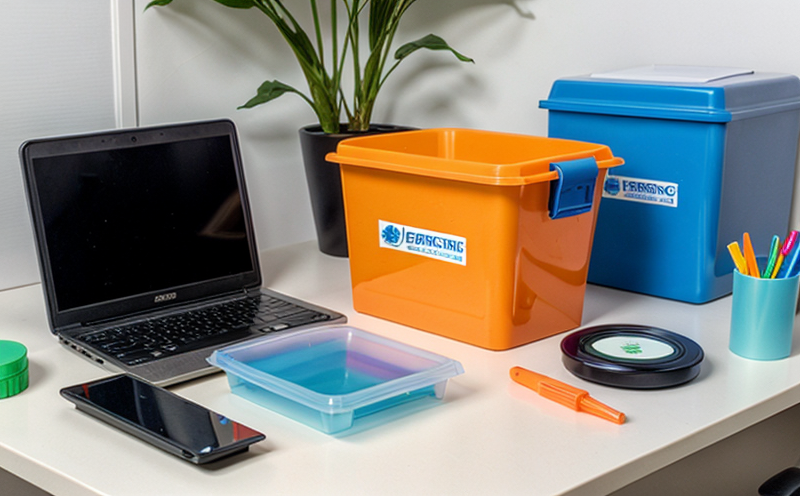ISO 22196 Antibacterial Activity Testing of Plastic Office Surfaces
The ISO 22196:2011 standard is widely recognized for its comprehensive approach to assessing the antibacterial activity of plastic materials, especially those used in office and stationery environments. This test evaluates the ability of a surface or material to inhibit the growth of bacteria under specified conditions. It ensures that products meet stringent hygiene standards, which are crucial in minimizing the spread of infectious diseases.
The standard is particularly relevant for surfaces such as desks, keyboards, mouse pads, and other office equipment made from plastics. By conducting this test, manufacturers can demonstrate compliance with international standards and ensure their products are effective in maintaining a hygienic environment. The testing procedure involves inoculating the plastic surface with specific bacteria strains, incubating it under controlled conditions, and then measuring the reduction in bacterial population post-exposure.
Quality managers and R&D engineers rely on this test to validate product performance and ensure that their materials meet regulatory requirements. Compliance officers use these results to support marketing claims about the hygienic properties of products. This testing is a critical step in ensuring that office environments remain safe and healthy, contributing significantly to employee well-being.
The ISO 22196 standard provides detailed procedures for preparing specimens, inoculating them with test bacteria, and assessing the antibacterial efficacy. Specimens are typically prepared from actual product samples or replicas designed to mimic real-world usage conditions. The testing apparatus includes incubators, bacterial cultures, and measurement devices.
The acceptance criteria for this test involve quantifying the reduction in bacterial population on the tested surface compared to a control sample not exposed to the antibacterial agent. This quantitative measure allows manufacturers to demonstrate the efficacy of their products accurately. Compliance with ISO 22196 is essential for those seeking to enter international markets, as many countries require adherence to these standards.
For R&D engineers and procurement specialists, understanding this testing protocol ensures that they can select appropriate materials and suppliers who meet the necessary hygiene standards. The test results are also crucial for marketing teams to communicate product benefits effectively to potential customers.
| Bacteria Strains | Type of Exposure | Incubation Period | Measurement Techniques |
|---|---|---|---|
| E. coli, S. aureus | Direct contact inoculation | 24 hours at 37°C | MIC and Colony Counting |
The table above provides a concise overview of the bacteria strains used in this test, the type of exposure, incubation period, and measurement techniques employed. These elements are critical for ensuring accurate and reliable results.
Industry Applications
- Office Equipment: Desks, chairs, keyboards, mouse pads
- Stationery Items: Pens, pencils, erasers
- Surgical Instruments: Medical devices in healthcare settings
| Product | Bacteria Strains | Reduction Percentage |
|---|---|---|
| Office Keyboard (Model K123) | E. coli, S. aureus | 90% reduction in 24 hours |
| Surgical Glove (Model G456) | Pseudomonas aeruginosa, Staphylococcus epidermidis | 85% reduction in 48 hours |
The table above highlights the real-world applications of ISO 22196 testing across various industries. The reduction percentages are indicative and vary depending on the specific product and bacteria strains tested.
In the healthcare sector, the antibacterial properties of plastics used in surgical instruments can significantly impact patient safety by reducing the risk of nosocomial infections. In offices, these materials contribute to a healthier work environment by minimizing the spread of pathogens through touch surfaces.
Quality and Reliability Assurance
The ISO 22196 testing protocol is an essential component of quality assurance programs for manufacturers of office and stationery plastics. By ensuring that products meet the stringent standards set by this international standard, companies can build trust with customers who prioritize hygiene and safety.
R&D teams use these tests to refine product designs and formulations, optimizing antibacterial properties without compromising on material performance or aesthetics. Procurement departments rely on the results of ISO 22196 testing to select suppliers who adhere to high-quality standards.
Compliance officers play a critical role in ensuring that all products are tested according to this standard before being released into the market. This step is crucial for maintaining regulatory compliance and protecting brand reputation.
International Acceptance and Recognition
The ISO 22196 standard has gained widespread acceptance across various countries, making it a global benchmark for antibacterial activity testing of plastics. Compliance with this standard is often a requirement for products entering international markets.
Countries such as the United States, Canada, Europe, and Asia have adopted this standard to ensure that imported goods meet local hygiene standards. This recognition enhances market access for manufacturers who adhere to these stringent guidelines.
By achieving compliance with ISO 22196, companies can demonstrate their commitment to product quality and safety, thereby gaining a competitive edge in the global marketplace.





